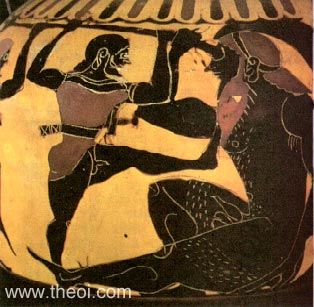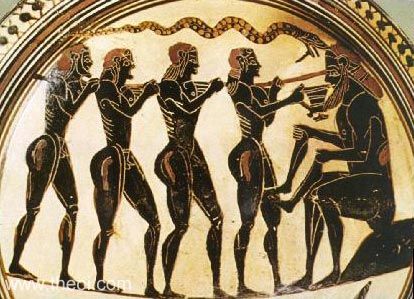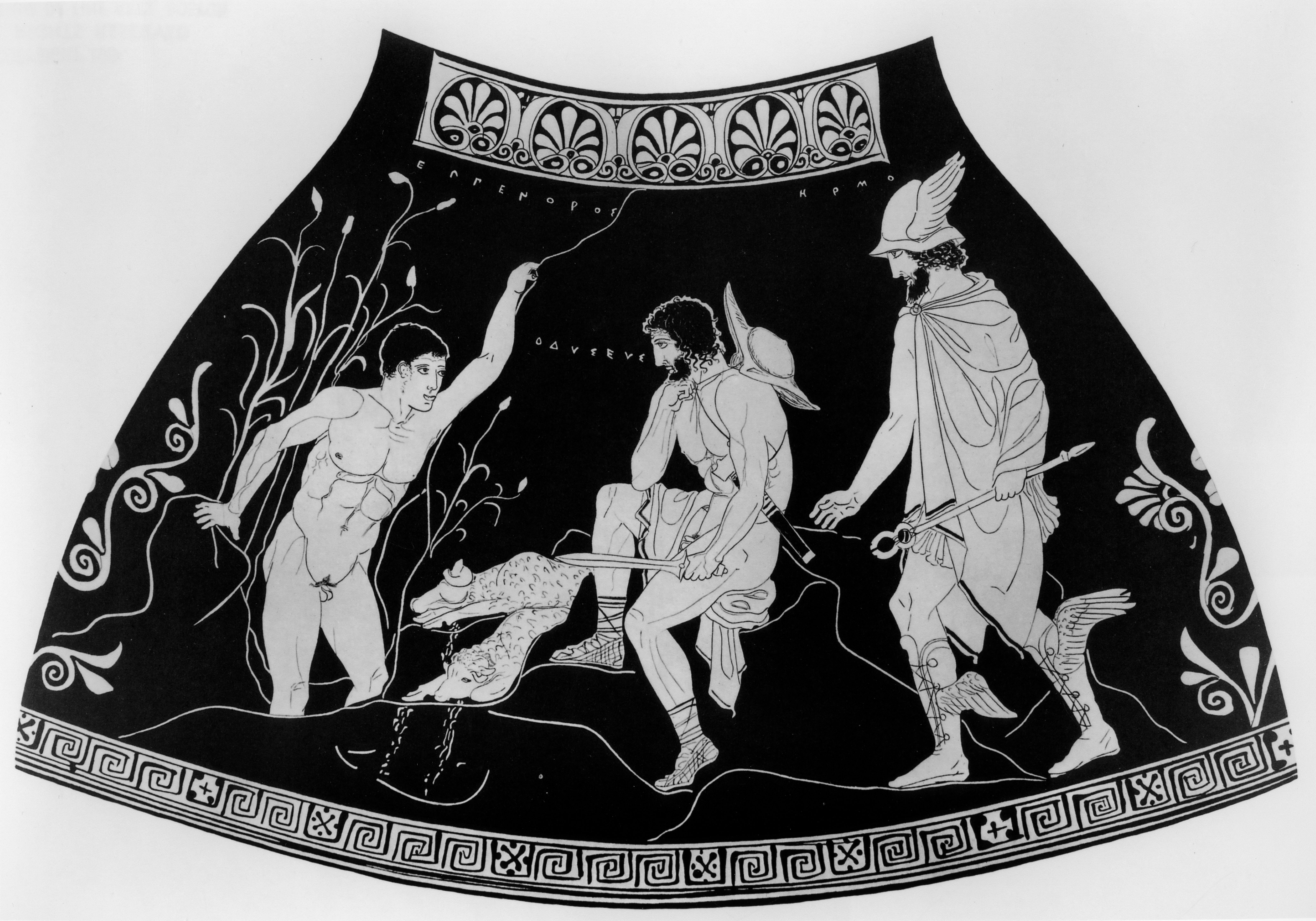Before we get started, a recent article about Troy:
https://www.smithsonianmag.com/history/in-search-of-troy-180979553/
Hospitality, aka 'Xenia'

vase painting in British Museum, c. 530BCE
https://www.theoi.com/Gallery/L8.3.html
In his mind Telemachus saw his father
coming from somewhere, scattering the suitors,
and gaining back his honor, and control
of all his property. WIth this in his mind,
he was the first to see Athena there.
He disapproved of leaving strangers stranded,
so he went straight to meet her at the gate,
and shook her hand, and took her spear of bronze,
and let his words fly out to her.
"Good evening,
stranger, and welcome. Be our guest, come share
our dinner, and then tell us what you need."
He led her in, and Pallas followed him.
Inside the high-roofed hall, he set her spear
beside a pillar in a polished stand,
in which Odysseus kept stores of weapons.
And then he led her to a chair and spread
a smooth embroidered cloth across the seat,
and pulled a footstool up to it. He sad
beside her on a chair of inlaid wood,...
...
Once they were satisfied with food and drink,
the suitors turned their mind to other things--
singing and dancing, glories of the feast.
A slave brought out a well-tuned lyre and gave it
to Phemius, the man the suitors forced
to sing for them. He struck the chords to start
his lovely song.
Telemachus leaned in
close to Athena, so they would not hear,
and said,
"Dear guest--excuse my saying this--
these men are only interested in music--
a life of ease. They make no contribution.
This food belongs to someone else, a man
whose white bones may be lying in the rain...
...
Who are you? From what city and what parents?
WHat kind of ship did you arrive here on?
What sailors brought you here, and by what route?
You surely did not travel here on foot!
Here is the thing I really want to know:
have you been here before? Are you a friend
who visited my father? Many men
came to his house. He traveled many places."
Athena's clear bright eyes met his She said,
"Yes, I will tell you everything. Iam
Mentes, the son of wise Anchialus,
lord of the Taphians, who love the oar.
I traveled with my ship and my companions
over the wine dark sea to foreign lands,
with iron that I hopeto trade for copper
in Temese. My ship is in the harbor
far from the town, beneath the woody hill.
And you and I are guest-friends though our fathers,
from long ago--Laertes can confirm it.
...
Tell me now--are you
Odysseus' son? You are so tall!
Your handsome face and eyes resemble his.
We often met and knew each other well,
before he went to Troy...
...
Telemachus was careful as he answered.
"Dear guest, I will be frank with you. My mother
says that I am his son, but I cannot
be sure, since no one knows his own begetting.
I wish I were the son of someone lucky,
who could grow old at home with all his wealth.
Instead, the most unlucky man alive
is said to be my father--since you ask."
...
(Athena speaks) "May Odysseus
come meet the suitors with that urge to kill!
A bitter courtship and a short life for them!
But whether he comes home to take revenge
or not, is with the gods. You must consider
how best to drive these suitors from your house."
(she advises him to call an assembly and go search for news of his
father)
if you hear that he
is dead, go home, and build a tomb for him,
and hold a lavish funeral to show
the honor he deserves, and give your mother
in marriage to a man. When this is done,
cosider deeply how you might be able
to kill the suitors in your halls--by tricks
or openly.... (cf. Telemachus' words at 375-80)
- If a foreigner/stranger shows up: the host should:
- greet them, feed them (and bathe them, although this can
happen after the next item)
- after that, ask them who they are and where they are from
- When Nestor has feasted Telemachus and Mentes (Athena), he
asks "Strangers, who are you? Where do you sail from on the
watery roads? Are you doing business or wandering without
destination like pirates who wander about at peril of their
life and bring trouble to others?" Od. 3.70ff
- reveals the tension in a first encounter, and the
codified procedure
- give them gifts
- when he first meets Polyphemus the Cyclops, Odysseus says:
"we are Greeks, come here from Troy...men of Agamemnon,whose
fame is greatest under the sky, forsaking that vast city and
killing many people. Now we beg you, here at your knees, to
grant us a gift, as is the norm for hosts and guests.
Please sir, my lord: respect the gods. We are your
suppliants, and Zeus is on our side, since he takes care of
visitors, guest-friends, and those in need." 9.265ff
- invokes divine sanction
- asks for a gift
- on the island of the Phaeacians, at Od. 8.382-433,
Alkinoos suggests that all the Phaeacian leaders give
Odysseus a gift, and it goes on from there.
- provide safe escort along their way
- In turn, the guest/stranger/foreigner should:
- Behave respectfully
- Provide news
- This creates or furthers a situation of "guest-friendship,"
called also Xenia:
- both sides can expect to be received well by the other
whenever a member appears at the other's place
- it is a lasting bond: intergenerational (Telemachus being
received at Nestor's and Menelaus' place
- Glaucus and Diomedes square off for battle (Iliad
6.120ff), but then discover that they have ties of Xenia
between them (from their fathers' time) and exchange armor
- Mythologically:
- Zeus Xenios and Athena Xenia are the patron deities of
foreigners
- big name gods give an idea of the importance of this
custom
- gods test societies by showing up in disguise as humble
strangers
- this is called theoxenia
- this harks back to a time when gods traveled amongst humans
- gods still do travel amongst some humans, namely the
Ethiopians, who are situated on the far edge(s) of the world
known to the Greeks
- Culturally/societally:
- a norm that humans should extend hospitality to
strangers/foreigners from a different polis
- backed up by divine approval/enforcement
- In Homer, this hospitality custom is primarily developed
between aristocrats
- many-sided
- morally, it is an obligation, a norm of behavior
- socially, it establishes personal ties between primarily
families
- the males travel and get to know their host's family
- there are clear norms at work:
- Odysseus, naked, meets Nausicaa: a fraught situation,
but Odysseus and Nausicaa handle it decently, because of
the norms of how to treat strangers and young women
- Nausicaa says at 6.208 "Giving costs little and
feels generous/is dear"
- Eumaeus says the same thing to Odysseus at Od. 14.58
- Alcinoos receives Achilles and says "The xenos
(stranger) and the suppliant are in place of a brother
to a man" at 8.546: the tie of guest-friendship is like
that of kin: this is an institution closer to marriage
than our modern "friendship" that comes and goes
- Telemachus shows up at Nestor's and then Menelaus'
- Achilles receives Odysseus and Phoinix and Ajax (Iliad
9.200): first he offers wine and meat, and only after
asks their business
- Achilles receives Priam: a kind of unusual xenia
between foes: he offers food and shelter and protection
- it sets up safe travel networks, a place to stay that
offers food, shelter, and protection
- inter-national relations
- but remember, there were no nations, just cities with
surrounding land and big chiefs and rich families who
ruled them.
- marriages can cement these bonds more closely
- continuous with proxenia???
- gift-exchange: the visitor receives gifts from the host
- prestige objects that demonstrate the status of the
giver
- also contribute to status of the receiver (when they get
home)
- in terms of cynically realistic views, this is all about
self-seeking motives: one needs a safe space, a group of
people who won't harm one, to survive, and this custom
provides that
- outwardly, it looks generous, but it is also
self-seeking: on both sides, honor is increased and
survival is heightened.
- It is a kind of social contract between families, one of
mutual safety and preservation.
- Odysseus says to Alkinoos, his host, "Alkinoos, king over
all the people, if you urged me to stay here for a year
before you gave the parting gifts and sent
me on my way, Iwould be happy. It would be far better
to reach my own dear home with hands filled full of
treasure. So all men would honor me and welcome me back home
in Ithaca"(it actually says I would be more aidoios 'respected'
and 'philos' dear) 11.356ff.
- It is both mutually beneficial and yet also involves
one-upping and striving for the upper hand
- Greeks were competitive in a thogoughgoing way: even the
bards competed in competitions
- The whole Trojan war is caused by a failure of xenia
- Paris of Troy was a guest-friend of Menelaus of Sparta
- Taking Helenis not just a personal affront: it not only
insults Menelaus personally, but publicly and through him, all
of those he rules in Sparta, and all of the network that
Sparta belongs to via xenia (mythologically represented by the
oath that Odysseus had all of Helen's suitors swear)
- it pulls at the whole social/economic/moral fabric of
rulership
- and so it is in the interests of all the rulers to insist
on addressing the affront
- Even so, the Iliad itself is not so much about
xenia, although it contains several instances of it
- The Odyssey could fairly be said to be about
xenia:
- the suitors are constantly said to be unwelcome guests, a
perversion of the custom, and right from the start, because of
that, they should be killed (so says Athena
- amidst that violation of xenia, Athena visits Ithaca in
disguise, and, while the suitors are rude to her, Telemachus
offers her xenia
- Telemachus' voyage is predicated on xenia: that is why he is
well received in Pylos and Sparta
- Odysseus' travels are repeated instances of xenia gone awry
or being followed
- Circe has both gone awry and then more traditional xenia
- Calypso
- the Phaeacians, however, are the prime example of xenia
working well
- due to their xenia, Odysseus is able to return to Ithaca
with resources
- their xenia gets them in trouble with Poseidon, however

- By <a
href="https://nl.wikipedia.org/wiki/User:Napoleon_Vier"
class="extiw" title="nl:User:Napoleon Vier">Napoleon
Vier</a>, <a
href="http://creativecommons.org/licenses/by-sa/3.0/"
title="Creative Commons Attribution-Share Alike 3.0">CC
BY-SA 3.0</a>, <a
href="https://commons.wikimedia.org/w/index.php?curid=1353019">Link</a>
- Odysseus blinding Polyphemus, an amphora from the
Eleusis Museum: geometric style, c. 650 BCE,archaic
-

- vase painting from Cabinet des Médailles, Paris, c. 550
BCE, later archaic
- https://www.theoi.com/Gallery/L8.5.html

- a geometric vase painting from the archaeological museum
in Argos
- Most people think that the Cyclops Polyphemus is the
primary example of a society that is uncivilized b/c it
lacks these norms: Polyphemus immediately asks Odysseus who
he is and where from and then violates the norm radically by
eating Odysseus' men, raw at that, and not letting them
leave. But note that Odysseus assumes hospitality by moving
in before it is offered, and so in a way the Cyclops was
deprived of the option of offering hospitality: that seems
rude on Odysseus' part, and that is their first
interaction.

- Odysseus and Polyphemus, 1897, by Arnold Böcklin, a Swiss
painter: now in the MFA, Boston
- https://collections.mfa.org/objects/564102/odysseus-and-polyphemus?
- Odysseus' return to Ithaca is marked by xenia at Eumaeus'
pigfarm and then at Odysseus' palace
- a side-story of xenia: at 21.14-40, we get the provenance of
Odysseus' bow, a gift from a guest-friend Iphitus: the
alliance was concluded abroad at neither's house.
- There are clear formula, large and small, associated with
xenia
- many particular words in Greek
- wine poured into cups
- gifts that are as much symbolically important as useful
- bathing
- supplication
- feasting
- sending on to next place
NOTE: Of course, such customs are not unique to Greece: they
occur across the world. But the specifics of the type scenes in
Homer, the language, and the particular objects offered make this
particular institution of hospitality Homeric.
- xenia is related to and co-occurs with supplication
(hiketeia):when Thetis supplicates Zeus on behalf of Achilles,
Priam supplicates Achilles (24.477) when Odysseus supplicates
Arete on the island of the Phaeacians (7.139)
- has specific language:
- an approach
- a real or figurative clasping at the knee
- a pleading tone
- it can be reduced to one word: lissesthai/gouneisthai
- or be expanded into a larger scene: Thetis' or Odysseus'
supplication.
- note that in Iliad, supplication occurs and the plea
is not granted on the battlefield in some poignant scenes
- does it have divine sanction?
- but in Odyssey, Odysseus seems to take advantage
of a divinely sanctioned procedure of supplication
- so what's going on? is it the bard using this for
plot/storytelling purposes, now upholding, now violating the
norm, sometimes with consequences, sometimes not? is that
what's up with xenia in Odyssey too?
Related to this is a bigger question about the status of people
versus things in Homer.
At least one scholar, Mary Scott, has plausibly suggested that the
value of people is entirely instrumental in Homer. People are
means to ends, not really any differently than the way possessions
are means to ends, the end being preservation of honor, status,
and survival. The idea that a person is and end in herself is not
present in the epics. Some among later Greeks will theorize that a
friend is "another self" and so should be of value in and of
herself, but that doesn't seem to be the case in the epics.
Of interest, but unrelated to guest-friendship, is this vase
painting of Elpenor, Hermes, and Odysseus

Figure 3. A landscape “of unusual, even startling interest.”
Red-figure pelikē: drawing of Side A, Odysseus, Elpenor,
and Hermes in the Underworld. The Lykaon Painter, ca. 440 BCE. The
Museum of Fine Arts, Boston, William Amory Gardner Fund, inv. no.
34.79.
https://archive.chs.harvard.edu/CHS/article/display/5722.chapter-2-greece-and-the-garden



